Gary Stevenson is blowing up right now.
If you’re unfamiliar, he runs a YouTube channel called Gary’s Economics which has amassed over 1 million followers by banging the drum on a simple message.
Wealth inequality is rising, and the solution is to tax the rich.

More specifically, Gary proposes a “wealth tax”, which would tax assets above a certain threshold (e.g. $1 million).
And it’s no surprise that he is having his viral moment.
Wealth inequality is indeed increasing. The Top 1% gets richer and richer every year while living standards in most developed nations (G7) seem to be stagnating.
His solution is to tax the 1%’s wealth and redistribute that wealth to the poor.
Sounds simple. But it won’t work.
Today we’re going to break down his argument into pieces:
Why this matters to you
What Gary gets right - The problem of wealth inequality
What Gary gets wrong - The solution of a wealth tax
The real cause of wealth inequality
What you can do about it to protect and grow your wealth
As always, you can watch this article on YouTube as well:
Let’s dive in.
Why Should I Care?
I know what you might be thinking…
Why should I care about what a random British YouTuber says about the UK economy?
And why should I care about what Brandon has to say about it?
Although Gary’s content is focused on the British economy, the problem he has identified is a global one. This is a big reason why he has gone viral this past week or so.
Specifically, here is the interview / debate that is going viral, from the Diary of a CEO podcast:
The problem statement is simple:
Wealth inequality is increasing globally, and living standards for the middle class appear to be stagnant.
Have felt like the economy has gotten tougher lately? Maybe…
You lost a job recently
Your living expenses have risen
You’re saving money but you don’t feel wealthier
…then this is very relevant to you.
This is precisely the problem that Gary is speaking to.
Not only that, but it’s a problem that especially resonates with young people, who feel like it’s harder to build for them to build wealth than it was for their parents or grandparents.
And that’s what makes Gary’s message so powerful, but deceiving. He speaks directly to a problem his viewers are experiencing. He makes them feel heard.
And then, he says the solution is simple - tax the rich.

Earlier this week, Gary was protesting outside of the UK Treasury for a wealth tax
Specifically, he proposes a wealth tax — a tax on assets (unrealized gains) above a certain amount.
And herein lies the problem.
Let’s investigate what a “wealth tax” really means.
Let’s get serious
What’s the mark of the world’s best, most growth-minded newsletter creators? They’re all on beehiiv.
Why? Our entire platform exists to help serious content creators scale faster. We’re built for those who are ready to take their content and build it into a behemoth.
It’s why we offer a no-code website builder. It’s why our ad network matches you with global brands like Nike and Netflix. It’s why we never take a dime of your subscription revenue. And it’s why Arnold Schwarzenegger and Ashley Graham trust us to connect with their huge fan bases.
It’s all to put your hard work in front of more people. So if you’re ready to build, ready to grow, and ready to make the world take notice, beehiiv is ready for you.
A Wealth Tax Hurts Workers
Most "wealth" isn’t sitting as cash in bank accounts.

The 1% holds their wealth in the form of productive capital. Businesses, real estate, factories, stocks, etc.
These are all assets that create jobs, drive innovation, and grow the economy.
If you recall, we covered this exact topic in Level 1 of the 5 Levels of Investing Series. In summary - if you want to build wealth like the ultra-rich, do not keep the majority of your net worth in cash. Try to invest like the bottom columns in the chart above.
Therefore, a wealth tax would force people to sell off assets just to pay the government. That means:
Less investment in businesses (bad for growth).
Lower productivity (bad for wages).
Fewer jobs (bad for everyone).
Furthermore, business owners and entrepreneurs can move their wealth.
If you tax capital, you get less capital, and that means lower living standards for everyone.
Wealth Taxes Have Been Tried… And Failed
This isn’t some untested theory, nor is it just my opinion.
Many countries have tried wealth taxes, and almost all of them scrapped them.
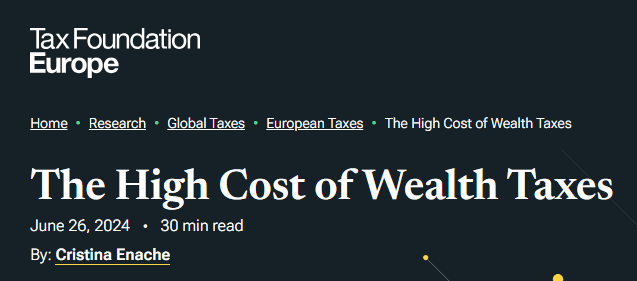
Even the Tax Foundation of Europe agrees that wealth taxes don’t work
France? Repealed it in 2017 after 70,000 millionaires left the country.
Sweden? Dropped it because it raised almost no revenue but scared off investment.
Germany, Denmark, the Netherlands, Finland? All had wealth taxes. All abandoned them.
Why? Because wealth in 2025 is mobile. You tax it, it moves. Meanwhile, the government gets less revenue than expected and economic growth slows.
Here is a direct quote from the Tax Foundation of Europe:
Countries have repealed their wealth taxes for a variety of reasons. They raise little revenue, create high administrative costs, and induce an outflow of wealthy individuals and their money. Many policymakers have also recognized that high taxes on capital and wealth damage economic growth.
Even proponents of higher taxes understand that a wealth tax is a bad idea.
The Real Cause = Bad Government Policy
Gary Stevenson thinks wealth inequality is caused by rich people hoarding money.
Here’s where I disagree.
The real culprit? Central banks and money printing.
There is a phenomenon in economics called the Cantillon Effect. Richard Cantillon, an 18th Century French economist observed that when new money is introduced (printed) into the economy, it benefits those closest to the money printer first.
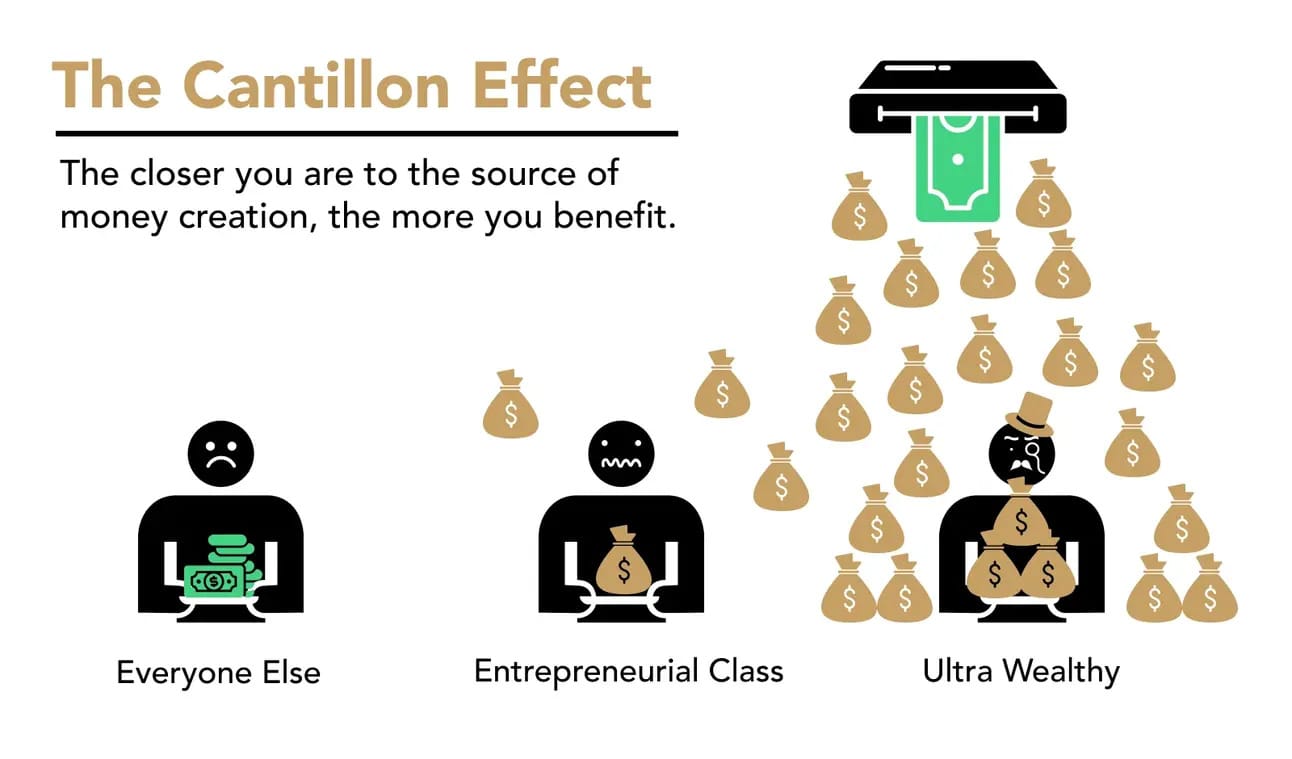
This phenomenon is especially noticeable during financial crises when the money printer goes into overdrive.
Take a look at the 2008 financial crisis, or even the C*vid crisis of 2020.
In both cases, the US government (as well as most governments around the world) introduced emergency measures to print money and help support the economy to prevent a deeper recession.
Where did this money go?
In 2008, it went to financial institutions and banks to keep them from going bankrupt. The argument was that the banks were “too big to fail” and if they went under, then it would cause more harm to the economy. But the first (and largest) beneficiaries of the money printing were the banks themselves.

In 2020, the newly printed money flowed straight into corporations, financial markets, and asset holders before it ever reached the average person. Airlines got bailouts, cheap credit flooded the real estate market, and the stock market soared into an extremely rapid “K-shaped” recovery. Meanwhile, the average person got a one-time stimulus check, which barely kept up with the rising cost of living.
This is the Cantillon Effect in action.
Those closest to the money printer (banks, corporations, asset holders) benefit first and the most, while those further away (workers, savers) are left dealing with the consequences. When the government prints money:
Asset prices skyrocket.
The rich (who own assets) get richer.
The poor (who don’t own assets) get left behind.
A wealth tax doesn’t fix this. Fixing the money does.
Stop reckless money printing. Let interest rates be set by markets, not bureaucrats. That would shrink inequality without killing investment.
Do You Trust the Government to Spend This Money Wisely?
There’s another huge problem with taxes in general that Gary does not ever address.
Let’s say the government does get a bunch of cash from a wealth tax (or any tax, for that matter).
Do you trust them to use it efficiently?

Look at the UK. Government spending has increased virtually every year since 2000.
Has inequality gone down?
If higher taxes were the solution, you’d expect to see things getting better over time.
I think Gary would argue the problem has only gotten worse.
Same story in the US and most of the G7:
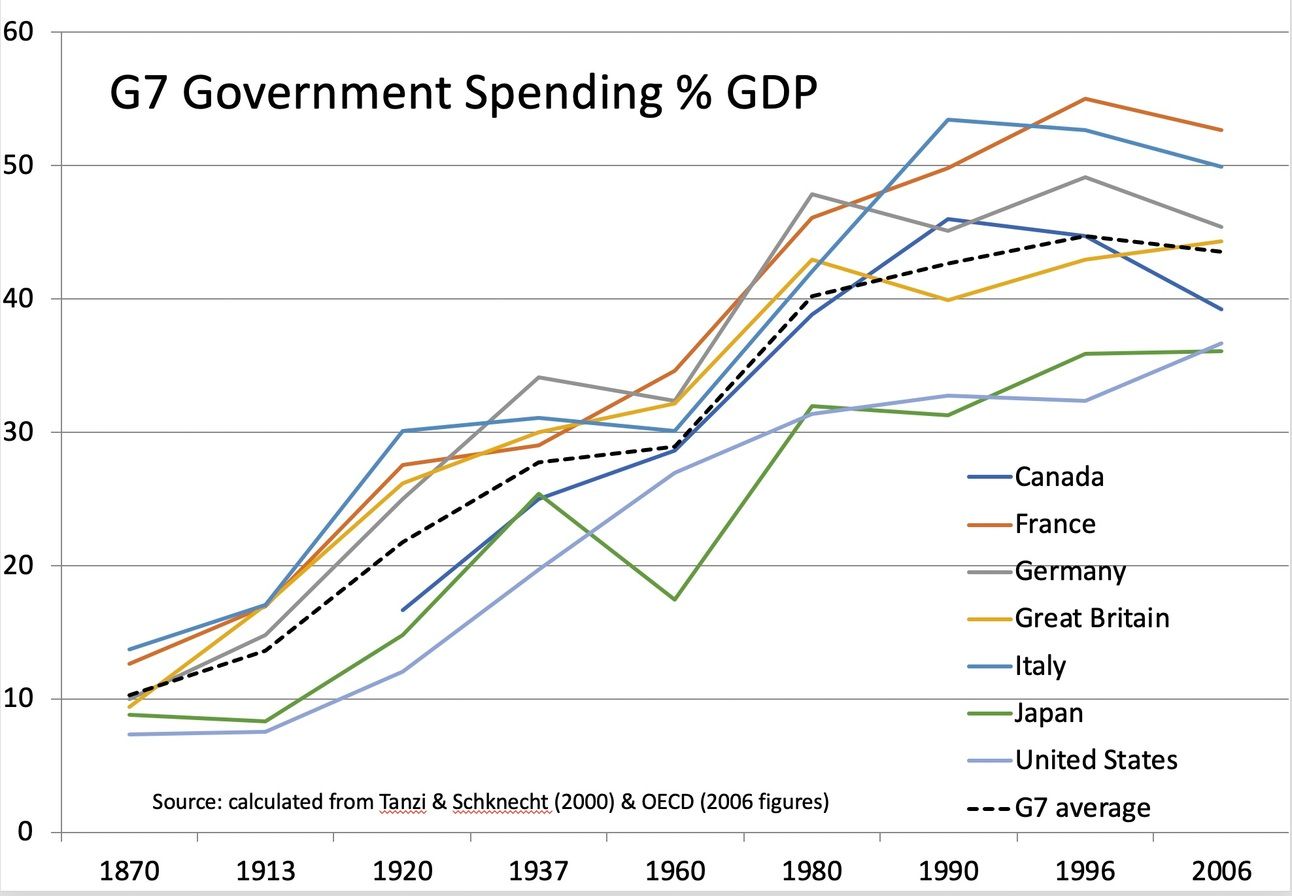
Governments don’t create wealth. They redistribute it — usually inefficiently, with tons of waste, bureaucracy, and corruption.
So if you think a wealth tax will magically fix inequality, ask yourself: why hasn’t all the existing taxation and spending done it already?
Wealth is NOT a Zero-Sum Game
I empathize with Gary. He sees his country’s economy getting worse and worse and he desperately wants to do something about it.
Personally, I think his views are nihilistic.
After all, Gary admittedly earned his fortune being a trader at Citi Bank.
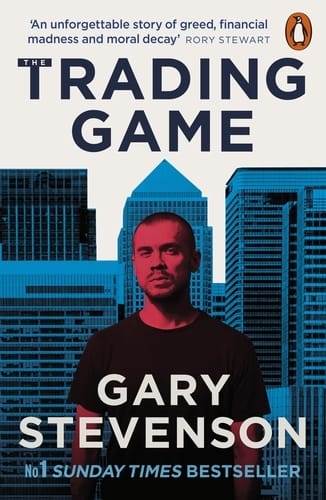
So it’s no wonder that his views on the economy have been shaped by his time trading, which is a particularly zero-sum game.
I can only hope and pray that with his new business, employing people, and creating real wealth through his YouTube channel and media brand… he comes to realize that the error in his worldview.
Wealth can be created. Wealth is not zero-sum.
Someone does not have to lose for you to win.
What To Do Instead
Instead of protesting against a rigged system, my advice to learn the rules of the game, and then play to win:
✅ Invest like the rich. Warren Buffett started with nothing. He didn’t whine about inequality; he learned how to own assets. Stocks, real estate, Bitcoin… get in the game instead of watching from the sidelines.
✅ Protect yourself from inflation. The government’s reckless money printing is eroding your purchasing power. Sitting in cash is a slow bleed. Again: learn how to store wealth in appreciating assets.
✅ Think long-term, not short-term. The rich don’t chase quick wins. Trading is glorified gambling. The truly wealthy own productive assets for decades. Stop trading your time for money and start building equity that works for you.
✅ Don’t wait for the government to save you. Politicians promise solutions, but they never deliver. The people who win are the ones who take ownership of their financial future.
Whether you like it or not, wealth inequality is a feature of the system, not a bug.
If we want to change the system, it starts with changing our own circumstances.
To your prosperity,
Brandon @ Wealth Potion
Build in Public Update
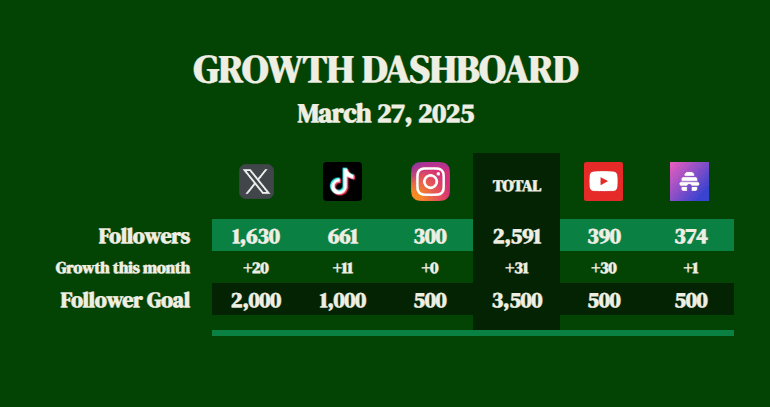
Last week’s video is officially my best performing video on YouTube.
Which is interesting for a few reasons:
I thought the video would flop. It was a video essay — more “off the cuff” rambling with fewer stats and figures — and not like my other videos. I was wrong.
It leaned more into storytelling. I’m an analytical person, so I often want to make sure my data is sourced, and backed by a strong logical argument. But human beings are a storytelling species.
It’s less about finance, and more about mindset / productivity. My primary goal is still to help people build wealth, but productivity is certainly adjacent. And while I know niching down is important, I’d be silly not to dig for gold here.
I’d love your feedback, too. As mentioned, I read all the replies.
Did you like last week’s video? Do you prefer the story-telling videos, or the ones with facts and figures? Why or why not?
Here’s last week’s video as a reminder:
Let me know ❤️

